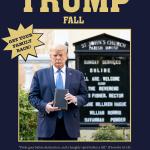A standard line of argument for sex education says that if young people aren’t taught the actual facts of the facts of life, then they’ll just wind up learning about it “on the streets.”
The idea there is that kids want the truth and they need and deserve to hear it. The desire to protect them, to preserve their innocence by preserving their ignorance, will wind up harming them in the long run. If you deny them access to good information, they’ll seek out whatever information they can find on their own. That may mean they’ll find out the truth for themselves, or it may mean they’ll find a mess of misleading misinformation.
But either way, it will also certainly mean this: They will have learned that they cannot rely on you or trust you to tell them the truth. And having learned that much the hard way, they won’t make the mistake of trusting you again. Children, it turns out, don’t like being treated like children. And adults tend to like it even less.
The various items in the previous post all deal with this same dynamic from different vantage points.
I appreciate what the church of the Latter Day Saints is trying to do by, as Peggy Fletcher Stack puts it, confronting the “‘epidemic’ of online misinformation” about Mormonism.
This is a problem largely of their own making, but the LDS leaders have seen the writing on the wall — or the writing on the screen — and they’re beginning to realize that “protecting” their people by protecting their secrets is not a sustainable approach. The attempt to preserve innocence by preserving ignorance is always doomed to fail.
What LDS leaders are coming to realize is that if they don’t tell their story, then others will tell it for them — and often in a way that’s critical, or outright hostile.
Before the Internet, it was possible not to tell “the whole story from the beginning,” to gloss over or avoid discussing “disruptive facts” or thorny issues or complexities in that story. What laypeople didn’t know couldn’t hurt them. But the Internet has made such glossing-over and avoiding impossible. All those “disruptive facts” are just a click or two away — along with plenty of even-more-disruptive misinformation that may be embraced by those seeking the facts they’ve been denied.
I don’t think the leaders of the evangelical subculture understand this change. They seem to think that access to information can still be controlled. They think they can still preserve the innocence and the ignorance of their followers by keeping all their “dirty little secrets” secret.
Many of those “dirty little secrets” are not really all that dirty. The “secrets” Ed Cyzewski writes about learning in seminary are not earth-shattering revelations or dark mysteries protected by a secretive conspiracy of seminarians. They’re just a bunch of things that it may seem easier not to talk about — “disruptive facts” or complicating factors.
Consider, for example, the “disruptive fact” of the “Synoptic problem” that J.R. Daniel Kirk discusses. The New Testament begins with four different Gospels and no two accounts are the same — the details don’t fit together, events are altered or ordered differently, and each author seems to have a different emphasis or interpretation. We can learn a great deal from those differences and variations, and seminary students study all of this in depth — exploring the relationships between these texts, and how and why each may have been composed in the way it was.
That discussion is pretty fascinating and illuminating if you’re the sort of person who enjoys seminary studies, but it’s also a lot more complicated than what can easily be dealt with in a simple three-point sermon. And unless all that complexity is conveyed with great care by someone willing to tell “the whole story from the beginning,” then a half-understood discussion of these differences and variations is likely to be perceived by some parishioners as hostility to the Bible. They haven’t had a chance to spend years studying the text in seminary, so it’s likely that some of them approach the text in a more simplistic way. Why risk upsetting them? It’s easier for pastors just to keep much of what they studied in seminary as “dirty little secrets.” It seems easier to try to preserve the congregation’s innocence by preserving their ignorance.
There’s a long history of such behavior — especially by pastors in evangelical churches where the gap between the seminary-educated clergy and laypeople is often particularly large. But, again, such secret-keeping is no longer possible. Every such dirty little secret is now just a Google search away.
And that is a Very Good Thing. Keeping secrets isn’t what seminary education is supposed to be for. The pastor doesn’t study theology in order to shield the other members of the church from having to study it. The pastor studies theology on their behalf, in order to share that knowledge with them.
I understand the dynamic Cyzewski describes when he writes of that which “pastors aren’t allowed to talk about because they’d lose their jobs.” That’s not hyperbole in evangelical churches, where even the most innocent passing remark — mentioning that Isaiah wasn’t written all at once, or saying “the author of 2 Timothy” instead of saying “Paul” — can provoke a fearful backlash from someone whose fragile faith requires them to fiercely defend a simplistic, imaginary version of the Bible.
But the actual truth is that this simple, imaginary Bible doesn’t exist. And if they don’t learn that from their pastor — if the pastor doesn’t tell them “the whole story” complete with all the complex, “disruptive facts” — then they’ll eventually learn it from somewhere else. Or they’ll learn something else from somewhere else. And either way, they’ll have learned that their pastor cannot be trusted.
“There are tremendous pastoral issues at stake,” here Kirk says, because “media will tell people the truth if we don’t.”
That’s always been true, of course, as that story from Latebloomer illustrates. Her fundamentalist church and sectarian home-school curriculum refused to tell her the truth about what Kirk calls “the Bible we actually have, rather than the Bible of our imaginations.” But she stumbled across the truth anyway — first in her family encyclopedia, then years later in the New Testament survey class at an evangelical Christian college.
(A dirty little secret about evangelical Christian colleges is that many of them teach the same dirty little secrets that Cyzewski learned in seminary. And not just in New Testament survey classes, but in history, biology, astronomy, geology …)
To keep the insular bubble of the evangelical subculture intact has always required some defense mechanisms. “I slammed the encyclopedia shut,” Latebloomer writes, and then, as trained, she “mentally explained away the data as yet one more humanistic attack on God’s obvious truth.” That’s the standard 1-2 combination for those determined to defend the bubble: 1) Keep the walls up and the encyclopedia shut; 2) Inoculate against potential glimpses of “disruptive facts” that get past the perimeter with a mythology of conspiratorial persecution.
But such defenses were never wholly effective, even in the past, when the media threatening to pop the bubble with disruptive truth-telling were mainly libraries and distant colleges that could be avoided or navigated with blinders intact. In the late 20th century, the rise of television and mass media made it more and more difficult for the evangelical subculture to preserve innocence by preserving ignorance. The Internet makes this almost impossible.
The LDS leaders seem to understand Kirk’s point. If “media will tell people the truth if we don’t,” then we must tell people the truth. Otherwise they’ll just learn about it on the street. Transparency, openness and the end of “dirty little secrets” is the only hope of preventing misinformation and maintaining trust.
But — and here’s the rub for those currently in charge within the evangelical bubble — maintaining trust will mean giving up control. For those who have sought to attain and maintain power by controlling information, that will mean giving up power.
I doubt they’re willing to do this voluntarily. I don’t think they have much choice, in the long run, but in the short run I expect them to put up an ugly fight to preserve their power — trying to preserve their control by preserving others’ ignorance.
The good news is that this is a fight they cannot win. Their ability to monopolize the information available to those within the bubble cannot be sustained. These controlling leaders may do some damage on their way down, but the writing is on the screen — they’re going down.















